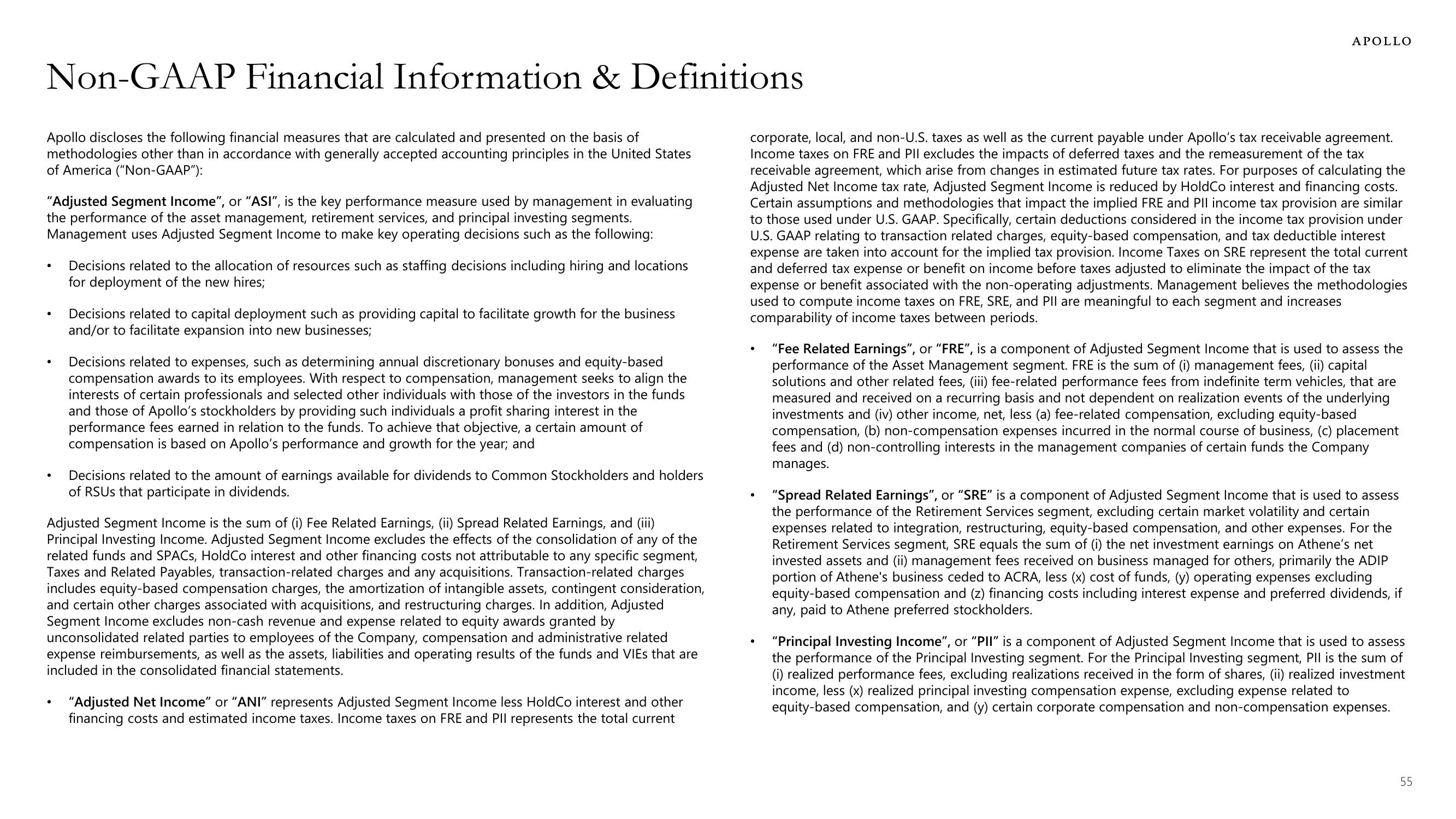Apollo Global Management Investor Presentation Deck
Non-GAAP Financial Information & Definitions
Apollo discloses the following financial measures that are calculated and presented on the basis of
methodologies other than in accordance with generally accepted accounting principles in the United States
of America ("Non-GAAP"):
"Adjusted Segment Income", or "ASI", is the key performance measure used by management in evaluating
the performance of the asset management, retirement services, and principal investing segments.
Management uses Adjusted Segment Income to make key operating decisions such as the following:
Decisions related to the allocation of resources such as staffing decisions including hiring and locations
for deployment of the new hires;
Decisions related to capital deployment such as providing capital to facilitate growth for the business
and/or to facilitate expansion into new businesses;
Decisions related to expenses, such as determining annual discretionary bonuses and equity-based
compensation awards to its employees. With respect to compensation, management seeks to align the
interests of certain professionals and selected other individuals with those of the investors in the funds
and those of Apollo's stockholders by providing such individuals a profit sharing interest in the
performance fees earned in relation to the funds. To achieve that objective, a certain amount of
compensation is based on Apollo's performance and growth for the year; and
Decisions related to the amount of earnings available for dividends to Common Stockholders and holders
of RSUS that participate in dividends.
Adjusted Segment Income is the sum of (i) Fee Related Earnings, (ii) Spread Related Earnings, and (iii)
Principal Investing Income. Adjusted Segment Income excludes the effects of the consolidation of any of the
related funds and SPACS, HoldCo interest and other financing costs not attributable to any specific segment,
Taxes and Related Payables, transaction-related charges and any acquisitions. Transaction-related charges
includes equity-based compensation charges, the amortization of intangible assets, contingent consideration,
and certain other charges associated with acquisitions, and restructuring charges. In addition, Adjusted
Segment Income excludes non-cash revenue and expense related to equity awards granted by
unconsolidated related parties to employees of the Company, compensation and administrative related
expense reimbursements, as well as the assets, liabilities and operating results of the funds and VIEs that are
included in the consolidated financial statements.
"Adjusted Net Income" or "ANI" represents Adjusted Segment Income less HoldCo interest and other
financing costs and estimated income taxes. Income taxes on FRE and PII represents the total current
APOLLO
corporate, local, and non-U.S. taxes as well as the current payable under Apollo's tax receivable agreement.
Income taxes on FRE and PII excludes the impacts of deferred taxes and the remeasurement of the tax
receivable agreement, which arise from changes in estimated future tax rates. For purposes of calculating the
Adjusted Net Income tax rate, Adjusted Segment Income is reduced by HoldCo interest and financing costs.
Certain assumptions and methodologies that impact the implied FRE and Pll income tax provision are similar
to those used under U.S. GAAP. Specifically, certain deductions considered in the income tax provision under
U.S. GAAP relating to transaction related charges, equity-based compensation, and tax deductible interest
expense are taken into account for the implied tax provision. Income Taxes on SRE represent the total current
and deferred tax expense or benefit on income before taxes adjusted to eliminate the impact of the tax
expense or benefit associated with the non-operating adjustments. Management believes the methodologies
used to compute income taxes on FRE, SRE, and PII are meaningful to each segment and increases
comparability of income taxes between periods.
●
"Fee Related Earnings", or "FRE", is a component of Adjusted Segment Income that is used to assess the
performance of the Asset Management segment. FRE is the sum of (i) management fees, (ii) capital
solutions and other related fees, (iii) fee-related performance fees from indefinite term vehicles, that are
measured and received on a recurring basis and not dependent on realization events of the underlying
investments and (iv) other income, net, less (a) fee-related compensation, excluding equity-based
compensation, (b) non-compensation expenses incurred in the normal course of business, (c) placement
fees and (d) non-controlling interests in the management companies of certain funds the Company
manages.
"Spread Related Earnings", or "SRE" is a component of Adjusted Segment Income that is used to assess
the performance of the Retirement Services segment, excluding certain market volatility and certain
expenses related to integration, restructuring, equity-based compensation, and other expenses. For the
Retirement Services segment, SRE equals the sum of (i) the net investment earnings on Athene's net
invested assets and (ii) management fees received on business managed for others, primarily the ADIP
portion of Athene's business ceded to ACRA, less (x) cost of funds, (y) operating expenses excluding
equity-based compensation and (z) financing costs including interest expense and preferred dividends, if
any, paid to Athene preferred stockholders.
"Principal Investing Income", or "PII" is a component of Adjusted Segment Income that is used to assess
the performance of the Principal Investing segment. For the Principal Investing segment, PII is the sum of
(i) realized performance fees, excluding realizations received in the form of shares, (ii) realized investment
income, less (x) realized principal investing compensation expense, excluding expense related to
equity-based compensation, and (y) certain corporate compensation and non-compensation expenses.
55View entire presentation